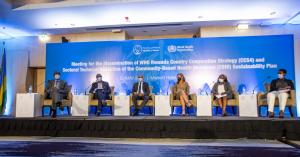WHO Rwanda launches the fourth Country Cooperation Strategy 2021-2024
Kigali, 28 May 2021 – The World Health Organization (WHO) Rwanda Country Office (RCO) launched the fourth WHO Country Cooperation Strategy (CCS). The strategy launched provides a roadmap for WHO support to the Government of Rwanda for the next four years (2021-2024).
The event took place at the Kigali, Marriott hotel and gathered leaders of government institutions, different partners and stakeholders as well as representatives of sister UN Agencies. The United Nations Resident Coordinator, Dr. Fode Ndiaye and WHO Africa Regional Director, Dr. Moeti Matshidiso delivered their messages remotely.
Both leaders applauded Rwanda for the strong leadership and significant advances in improving health and the wellbeing of its people. Dr. Matshidiso highlighted the risk of COVID-19 disrupting health systems and threatening to revers hard fought gains in health and development.
“Rwanda has an enormous task to meet its ambitious goals towards improving the health and well-being of the population. This Country Cooperation Strategy is therefore timely as we all have the responsibility to work together. I encourage the country to use past, present and future lessons from today’s COVID-19 pandemic to continuously improve the resilience of people centered health systems.”
Over the last 16 years WHO and Rwanda have implemented three Cooperation Strategies. The role of WHO as highlighted in this CCS is to support the Government of Rwanda in building upon and sustaining the impressive improvements in the health of its population in the past 20 years.
In his remarks, the Minister of Health, Honorable Dr. Daniel Ngamije who was the guest of honor, highlighted the relevance of having a cooperation strategy. “We started this journey more than two years ago and today the Strategy is here. This is a tool that regulates our interactions with WHO to make sure we implement what we agreed. It is an important tool we sign to make sure that in the coming years we know what we are doing and which areas we want WHO to make a difference in the support they are providing.”
The development of this CCS was guided by four of the country’s major policy and strategy documents: The National Strategy for Transformation (NST 1) (2017-2024), the National Health Sector Policy (2015), the Fourth Rwanda Health Sector Strategic Plan (HSSP IV) (2018–2024), and the United Nations Development Assistance Plan for Rwanda (UNDAP II) (2018-2023).
WHO Rwanda Representative Dr. Kasonde Mwinga acknowledged the efforts and contributions that led to the development of the strategy.
“This launch has been long in the making. I would like to thank all the contributors who gave insights that led to the development of this fourth Country Cooperation Strategy. The work that we do with the Ministry of Health, we believe is useful for the health of those already here and those of us who are yet to be born. We look forward to work with different partners through different sectors.”
In the next four years, the Government will be addressing a number of challenges to meet the population’s growing demand for quality health care and the changing health needs of the population including: a growing burden of non-communicable diseases, high rates of stunting in children under five, the still high rate of maternal and neonatal mortality, emerging and re-emerging diseases and inadequate access to improved water and sanitation.
The strategic priorities of this CCS and the activities under each priority are designed to support the Government of Rwanda in addressing the aforementioned challenges in order to reach its health goals and targets. A mid-term review of the CCS will be conducted in 2022 and a final evaluation before the end of 2024.
The CCS reflects WHO’s major reform agenda outlined in its 13th General Programme of Work (GPW13) (2019-2023) and the WHO African Regional Transformation Agenda, which aim to improve access to universal health coverage, better protect people from health emergencies, and improve people’s health and well-being. It forms the basis for aligning WHO’s collaboration with other United Nations bodies and development partners in Rwanda.



